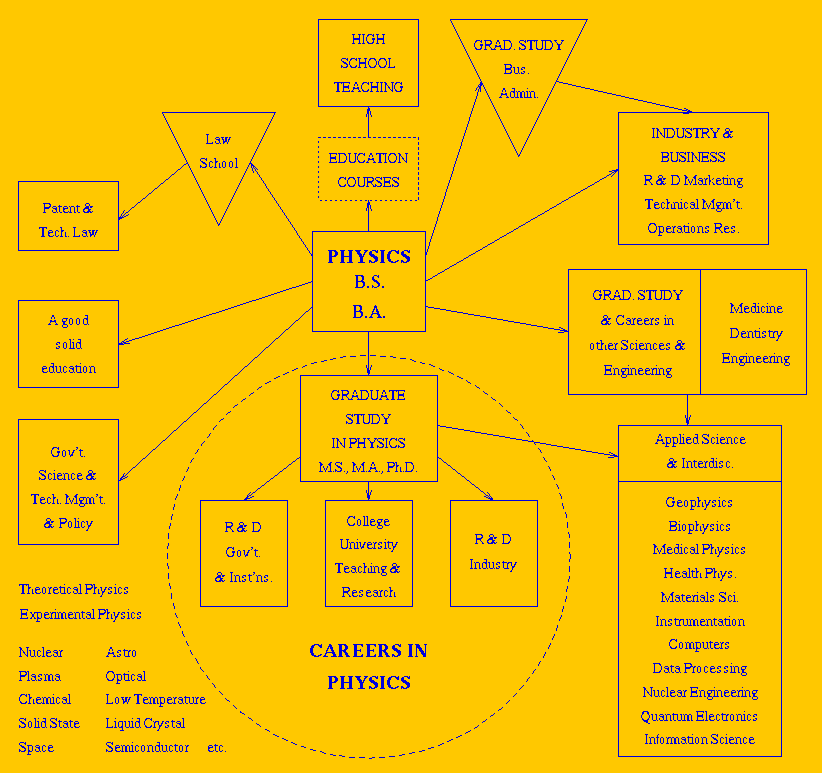Careers for Graduates with BS & PhD Physics Degree
Most physicists are employed by educational institutions, industrial firms, government laboratories, or federally funded research and development centers. Vocations in physics fall into four major categories:
- Research:
Basic research has as its goal the understanding of physical phenomena without a specific application in mind. Applied research leads to the solution of problems of national importance or of significant commercial value. - Development and Design:
Work in this area utilizes both basic and applied research to improve existing products, processes and instruments, and to develop new ones. - Teaching:
After earning an undergraduate or PhD physics degree, many physicists are employed in academic institutions, including instructors at the high school, community college, college, and university levels. In the latter, research and teaching are often combined. - Management and Other Areas:
Physicists can be found in a wide variety of areas such as research administration, university administration, science reporting, technical management and marketing, and in such fields as metallurgy, electronics, food processing and packaging, health and radiation safety, pollution control, computer technology, financial services and a broad and continually expanding array of other possibilities.
Graduate School- PhD Careers
To become a professional in the field, physics, like all the sciences and mathematics, medicine, dentistry, etc., requires education and training beyond the bachelor's physics degree; that is, it requires the PhD Physics degree. In general, this means another five or six years of schooling -- but it is not costly. In the graduate PhD Physics program at Kent State University, graduate assistants normally receive a full tuition scholarship and are paid nine-month stipends ($18,540) during the academic year. In return, the student must render service to the Physics Department as a TA (teaching assistant) or an RA (research assistant). Both responsibilities provide good experience for the PhD Physics student, and, as an RA, the student works in his/her research area. A very useful guide for students preparing to apply for graduate school has been compiled by the physics department at Oregon State.
A list of the largest industrial employers of PhD physicists was obtained in 1998 by the Education and Employment Statistics Division of the American Institute of Physics (AIP).
Bachelor's Degree Careers
The flowchart below outlines some of the career paths that are possible for graduates with bachelor's physics degrees. For new graduates at the bachelor level, there are fewer jobs in physics than, for example, in chemistry or engineering; however, there are also fewer applicants competing for those jobs.
Some of the industries that hire graduates with a bachelor's degree in physics include: electrical/electronics; semiconductor; automotive; communications; aerospace; instrumentation; and materials. Some of these industries (e.g., automotive) don't specifically advertise for physics graduates, but they do hire. Industries such as these are often interested in hiring graduates that can demonstrate a breadth of knowledge, and who have the ability to analyze and solve problems. These abilities are well-known to characterize graduates with training in physics.
In May 2018, the median annual wage of physicists was $120,950. The lowest 10% of workers earned less than $59,300 and the top 10% earned at least $193,280. Salary differences among physicists reflect their work sector, education, years of experience, and locale [Source: Occupational Outlook Handbook].

Resources
For a quick overview of who employs people with a physics degree, see What can I do with this degree? The AIP also provides state-by-state listings of the companies that recently hired physics bachelors. The Career Services Homepage of the AIP is a good starting point for further exploration of career options for physicists.
Another good source of information is the Occupational Outlook Handbook from the Bureau of Labor Statistics. This is a searchable resource with job descriptions and outlooks for specific occupations. It contains an entry for Physicists and Astronomers, as well as entries for many related occupations.
Another recommended site is Science Next Wave, a weekly on-line publication that covers scientific training, career development, and the science job market. It is geared towards preparing young scientists to be competitive in today's employment market. Each week the site publishes articles and features on a range of topics ranging from basic career advice to first-person perspectives from scientists pursuing a variety of careers.
The sites GradSchools.com, GradschoolShopper.com, TIPTOP for PhD studentships, and Student's Guide to Choosing a Graduate Program offer useful resources for prospective graduate students in physics and related fields. Also, check out monster.com for up-to-date listings of jobs requiring educational accomplishments ranging from undergraduate physics degrees to a PhD physics degree. (Conduct a job search using the keyword "Physics".)
Another good site is Academic Careers Online, which includes faculty, teacher, research, post doc, adjunct, library, administrative and senior management positions at (community) colleges, universities, research institutes, and schools around the world. There is no charge for applicant services. You can: (1) Search current job openings (new ones are added daily), (2) Post your resume for employers to review, and/or (3) Receive e-mail alerts when matching jobs are posted.
Finally, you might find your next job or hire at jobs.physicstoday.org. Hundreds of new science, engineering, and computing jobs are posted on this site each month.
